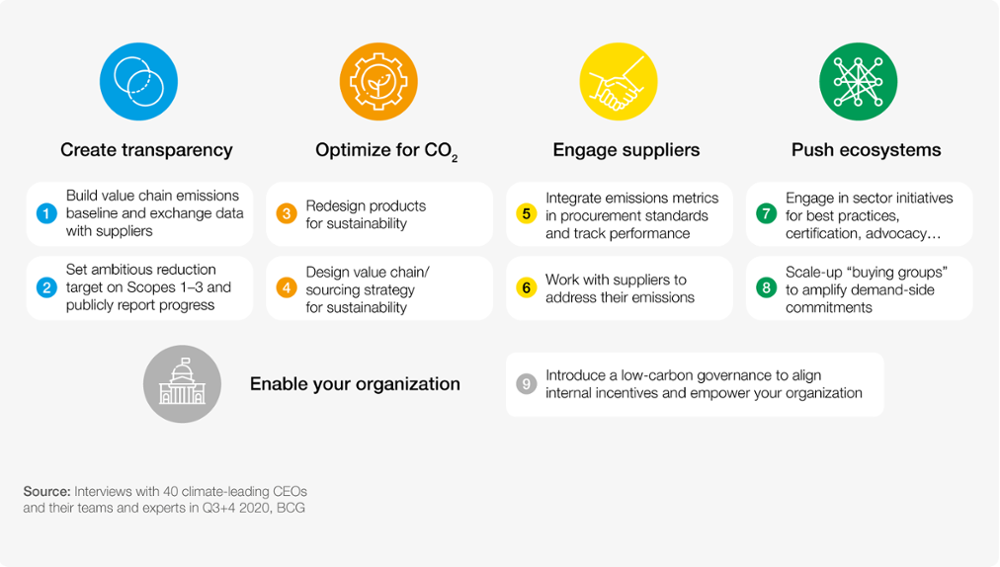
With BCG having just released a major research report in collaboration with the World Economic Forum (WEF) - examining how the decarbonisation of global supply chains offers a "game-changing opportunity" to help fight climate change - Environment Analyst's Liz Trew caught up with Bas Sudmeijer, BCG’s London-based managing director & partner and climate & energy transition lead, to find out how sustainability and climate are being embedded in the group strategy and client offerings.
As one of the ‘big three’ management consultancies (otherwise known as MBB) - alongside McKinsey and Bain & Co - BCG has ascended the ranks over the last decade, with its global sales growing from $2.75bn in 2009 to $8.5bn in 2019. During this time, its talent force has expanded from 6,900 to 21,000 employees worldwide. Furthermore, 2019 was the sixth consecutive year of double-digit growth for the Boston-headquartered firm.
In addition to its impressive record of growth, BCG is also a company making big waves where social impact and sustainability are concerned. According to its latest annual sustainability report:
- BCG enabled almost $2bn in consulting on social impact in the past ten years (25% of this in 2019). It has developed 700 social impact projects for more than 450 organisations.
- It worked on more than 350 climate and environment projects, assisting more than 250 organisations in 2019.
- BCG invested to enable almost $300m in climate and environment consulting projects in 2019.
- The company achieved a 15% reduction in carbon emissions per BCG employee in 2019, and supported by 11 climate-mitigation, carbon-offset projects around the globe to maintain carbon neutral company certification.
There were no signs of any slowdown in momentum through 2020, with BCG setting itself science-based targets last September, committing the firm to become net-zero by 2030. This includes a pledge to reduce by 30% scope 3 business travel emissions per BCG employee by 2025. In addition, group CEO Rich Lesser became the chief advisor to WEF’s prestigious Alliance of CEO Climate Leaders, cementing BCG’s ambition to lead in the space.
Climate is now a "top-three priority" within the BCG executive committee, explains Sudmeijer, alongside digital transformation and business resilience - or ‘winning in the 20s’ as the group strategy puts it - with the latter reflecting the imperatives for business success in the decade ahead, recognising the fundamental shifts in leadership, future of work trends and other societal changes. Importantly this means climate is prioritised as an area for investment and service area development, and also as a push area for BCG’s clients. "This is because it is both the right thing to do, but also because we see a lot of commercial potential," says Sudmeijer.
Centre for Climate Action
Climate and sustainability form one of several horizontal activities within BCG. "Like many other advisory firms, we are typically organised by industry sector," says Sudmeijer. "So we have our horizontal climate team that serves a broad spectrum of clients, from the public sector to financial services from an ESG investment angle, but we are perhaps most closely associated with supporting the heavy emitters - energy firms, utilities, etc - in tackling their climate footprint.
"And we do this globally, including in North America," he adds, "although there is perhaps a lot of concentration of climate activity in Europe. But we are also seeing a growing demand from the Middle East."
There are some specific topics where Sudmeijer notes increasing demand, including hydrogen and carbon capture utilisation and storage (CCUS), while "in Asia Pacific, we are seeing a lot of interest from a nature perspective, including physical nature-based solutions, but also as countries increasingly look towards renewables". Coming from a background in aerospace engineering and having been with BCG since 2006, Sudmeijer himself is BCG's global topic leader for CCUS, whilst his work also has a particular focus on utility transformations, working primarily with Europe's largest utilities and oil & gas (super) majors.
In 2019, BCG established its Centre for Climate Action (CCA), a (virtual) centralised unit with global reach dedicated to these endeavours. "The CCA allows us to have a much more coherent way of going to our clients and explaining what we can bring to the table," he says.
The type of work undertaken by the CCA and other BCG people more broadly affiliated with climate activities - which now number around 600, having grown significantly in the last two or three years - often involves ambition setting, determining decarbonisation pathways, technology/portfolio investment appraisals and due diligence. And at a government level, BCG also advises countries on their routes to decarbonisation and nationally determined contributions (NDCs), and on shaping policy.
"The Centre for Climate Action allows us to have a much more coherent way of going to our clients"
Road to Glasgow
Sudmeijer reveals that BCG is currently supporting the UK government Cabinet Office in preparing for the COP26 meeting Glasgow in November. The involvement is on two fronts. Firstly, supporting Nigel Topping in his appointed role as high level climate action champion for the UN climate talks, with Topping focused on encouraging more corporates to make pledges to reduce their impacts ahead of COP26 and promoting the UN Race to Zero. Secondly, BCG is advising the government on its overarching narrative and strategy-setting, particularly regarding the role of non-state actors in achieving the Paris goals. Beyond this, the work remains highly confidential.
BCG has also been working closely with the WEF, co-producing a number of research studies in support of January’s Davos Agenda 2021 meeting. Their most recent report, entitled ‘Net-zero challenge: the supply chain opportunity’, examines the major global supply chains (including food, construction and fashion) that account for more than half of global greenhouse gas emissions. The study’s findings suggest that end-to-end decarbonisation would only add a minimal 1-4% to end-consumer costs in the medium term, and as such offers a game-changing opportunity to companies.
Commenting on the key takeaways, report co-author and managing director & partner at BCG’s Centre for Climate Action, Patrick Herhold, says: "The argument that costs are a major barrier to reducing emissions is increasingly flawed - around 40% of the emissions across the eight major supply chains we analysed can be eliminated with measures that bring cost savings or are at costs of less than €10 per ton of CO2 equivalent."
Therefore, Herhold suggests that "increasing process efficiency and the use of recycled materials, as well as buying more renewable power, provides companies with major climate gains at very low costs". The report points to nine major actions that company CEOs should take to address supply chain emissions (see image below).
Figure 1: Addressing supply chain (scope 3) emissions [Source: Net-Zero Challenge report by BCG & WEF]

Beyond strategy
There is sometimes a perception where corporate sustainability is concerned that management consultants will get involved at the strategic, planning stage and are less present when it comes to the implementation. But Sudmeijer rebukes this claim on behalf of BCG, stating: "I would love to say that we were in implementation everywhere, but frankly that’s not the reality. However, there is a large swathe of our clients where we remain involved in the education process and partner with them to implement their roadmaps. Given the complexity, there’s often some very interesting work for us to do, for example looking at the commercial due diligence of specific types of technologies.
"Whether it's the cement industry or the steel industry, few companies can decarbonise on their own, without the help of a supply chain. It requires a lot of collaboration, and this is a role that we naturally play as consultants sitting across different sectors and industries."
An example is the type of work BCG undertakes through its role supporting the Oil & Gas Climate Initiative, which is a collaboration involving a dozen or so of the largest global O&G firms. BCG has been evaluating the best locations around the world for CCUS hubs in terms of the economics, geospatial analytics, and policy and regulatory landscape. "We certainly want to do more work like this on designing and shaping the markets, and creating the right sorts of collaborations to facilitate the roll-outs of infrastructure," Sudmeijer adds.
"We also see ourselves playing a large role in market design and the shaping of nature and carbon markets - which isn’t without its controversies of course. But we want to play in this space, as to avoid catastrophic global warming we will need carbon removal in addition to emissions reduction, and many of our clients are seeking to be climate positive and net-zero. Some of this may have to be done through reforestation or buying offsets, on which they will have a lot of questions which we can help with. This is another area where we are helping on the implementation side."
Growth ambition and COVID
Environment Analyst asked Sudmeijer what trends he has observed in the climate and sustainability space in light of the global pandemic. He is emphatic that there hasn’t been a deceleration in commitment: "BCG has produced a couple of publications around this, and our observations are that the amount of green stimulus from governments is significantly increasing in response to the pandemic.
"The numbers of companies making commitments has also only increased. And then if you look at the Davos Agenda, the pandemic is up there, but climate is right next to it. This to me suggests a sense of urgency which hasn’t gone away, underscored by one of Biden’s first executive orders being to rejoin the Paris Agreement.
"There are some specific struggles of course, for example in a virtual world executing climate funds becomes more difficult. But we see that those governments that responded fast and more successfully to the pandemic have also been able to respond much more successfully on the climate [crisis] in terms of how they shape their fiscal stimulus packages - good examples being South Korea and Germany.
"I think this will remain a key theme of 2021, that COVID recovery stimulus will become more interrelated to climate-related infrastructure investments."
In terms of BCG’s own growth ambitions in the space to help ‘win the 20s’, the biggest single limiting factor might just be finding enough of the right talent to keep up with the ever-growing demands of its clients here.

For more information on how the role of sustainability, the race to zero and ESG is shaping the environmental and sustainability consulting market join us at the Environment Analyst Global Business Summit (8-9 June 2021, online).

